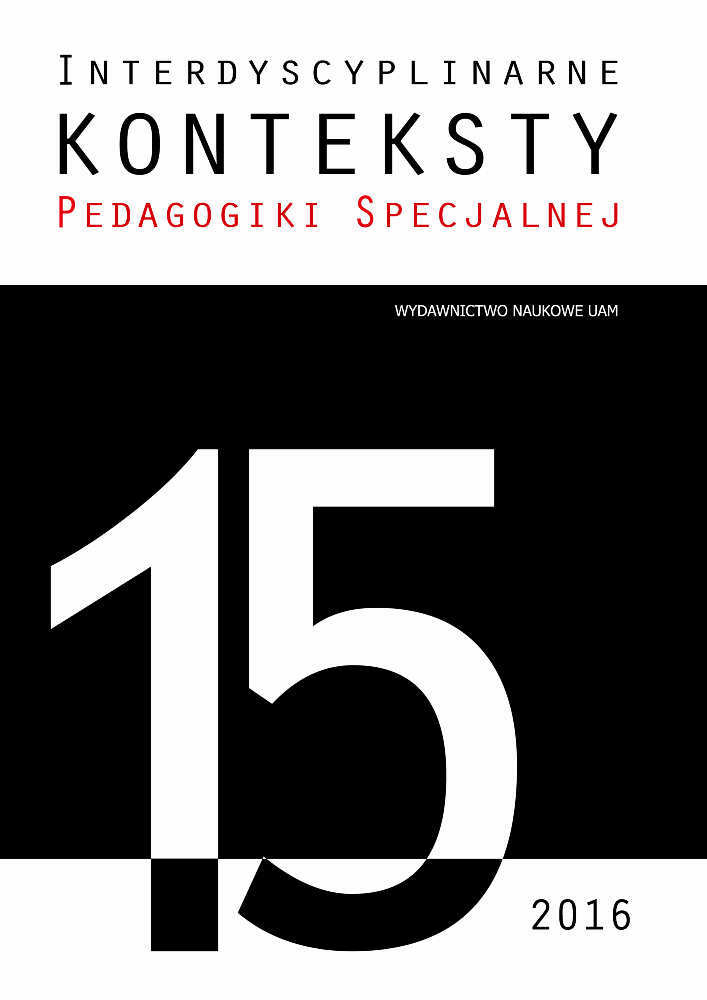Abstract
This article provides an overview of two approaches to peer-mediated intervention that have been effective in improving the social and communicative interactions among preschool children with developmental disabilities and their classmates without disabilities. These peer-mediated interventions involve teaching facilitative initiation and responsive interaction strategies to peers and teaching sociodramatic scripts. The studies presented in this paper prove that thanks to relationships with properly trained peers disabled children more often get involved in team games, more often establish interactions with their peers, are more eager to talk to them and less often exhibit socially unacceptable behaviors.
References
Cooper C.R., Development of collaborative problem-solving among preschool children, “Developmental Psychology” 1980, nr 5.
Damond W., Phelps E., Strategies uses of peer learning in children’s education, [w:] Peer relationships in child development, red. T.J. Berndt, G.W. Ladd, John Willey & Sons, New York 1989.
Denning C.B., Stanton-Chapman T.L, Effects of social communication Intervention on interactive play for young children with disabilities, “Journal of Education and Human Development” 2014, nr 3.
English K. Shafer K., Goldstein H., Kaczmarek L., Teaching buddy skills to preschoolers, [w:] Mental retardation and intellectual disabilities. Teaching students using innovative and research-based strategies, red. L. Wehmeyer, M. Agran, American Association on Mental Retardation, Annapolis Junction 2005.
Foot H.C., Morgan M.J., Shute R.H., Children helping children, John Wiley&Sons, New York 1990.
Goldstein H, Cisar C.L., Promoting interaction during sociodramatic play: Teaching scripts to typical preschoolers and classmates with disabilities, “Journal of Applied Behavior Analysis” 1992, nr 25.
Goldstein H., Ferrell D.R., Augmenting communicative interaction between handicapped and nonhandicapped preschool children, “Journal of Speech and Hearing Disorders” 1987, nr 52.
Goldstein H., English K., Shafer K., Kaczmarek L., Interaction among preschoolers with and without disabilities. Effects of across-the-day peer intervention, “Journal of Speech, Language and Hearing Research” 1997, nr 40.
Goldstein H., Schneider N., Thiemann K., Peer-mediated social communication intervention. When clinical expertise inform treatment development and evaluation, “Topics in Language Disorders” 2007, nr 2.
Goldstein H., Wickstrom S., Peer intervention effects on communicative intervention among handicapped and nonhandicapped preschoolers, “Journal of Applied Behavior Analysis” 1986, nr 19.
Goldstein H., Wickstrom S., Hoyson M., Jemieson B., Odom S., Effects of sociodramatic script training on social and communication interaction, “Education and Treatment of Children” 1988, nr 11.
Jamison K.R., Forston L.D., Stanton-Chapman T.L., Encouraging social skill development through play in early childhood special education classrooms, “Young Exceptional Children” 2012, nr 2.
Perret-Clermont A.N., Social interaction and cognitive development in children, Academic Press, London 1980.
Piaget J., Mowa i myślenie u dziecka, Książnica – Atlas, Warszawa – Lwów 1929.
Sainato D., Goldstein H., Strain P., Effects of self-evaluation on preschool children’s use of social interaction strategies with their classmates with autism, “Journal of Applied Behavior Analysis” 1992, nr 25.
Stanton-Chapman T.L., Promoting positive peer interactions in the preschool classroom: The role and the responsibility of the teacher in supporting children’s sociodramatic play, “Early Childhood Education Journal” 2015, nr 43.
Stanton-Chapman T.L., Denning C.B., Jemison K.R., Exploring the effects of a social communication intervention for improving requests and word diversity in preschoolers with disabilities, “Psychology in the Schools” 2008, nr 45.
Stanton-Chapman T.L., Snell M.E., Promoting turn-taking skills in preschool children with disabilities: The effects of peer-based social communicative intervention, “Early Childhood Research Quarterly” 2011, nr 26.
Strain P.S., Effects of peer social initiations on withdrawn preschool children: Some training and generalization, “Journal of Abnormal Child Psychology” 1977, nr 5.
Strain P.S., Kerr M.M., Regland E.U., Effects of peer-mediated social initiation and prompting/reinforcement procedures on the social behavior of autistic children, “Journal of Autism and Developmental Disorders” 1979, nr 9.
Strain P.S., Shores R.E., Timm M.A., Effects of peer social initiation on the behavior of withdrawn preschool children, “Journal of Applied Behavior Analysis” 1977, nr 10.
Tudge J., Rogoff B., Wpływ rówieśników na rozwój poznawczy – podejście Piageta i Wygotskiego, [w:] Dziecko wśród rówieśników i dorosłych, red. A. Brzezińska, G. Lutomski, B. Smykowski, Zysk i S-ka, Poznań 1995.
Twardowski A., Kształcenie dialogowej kompetencji komunikacyjnej u uczniów niepełnosprawnych intelektualnie, Instytut Pedagogiczno-Artystyczny UAM, Kalisz 2002.
Twardowski A., Rola pełnosprawnych rówieśników w procesie wspomagania rozwoju dzieci z niepełnosprawnościami, [w:] Wspomaganie rozwoju i rehabilitacja dzieci z genetycznie uwarunkowanymi zespołami zaburzeń, red. A. Twardowski, Wydawnictwo Naukowe PTP, Poznań 2004.
Twardowski A., Wpływ nauczających relacji z pełnosprawnymi rówieśnikami na rozwój dzieci z niepełnosprawnościami, [w:] Pedagogika specjalna – koncepcje i rzeczywistość. Socjopedagogiczne aspekty rehabilitacji osób niepełnosprawnych, red. T. Żółtkowska, M. Wlazło, ZAPOL, Szczecin 2008.
Twardowski A., Możliwości wykorzystania rówieśniczego tutoringu w edukacji dzieci z niepełnosprawnością intelektualną, „Interdyscyplinarne Konteksty Pedagogiki Specjalnej” 2014, nr 5.
Wygotski L.S., Wybrane prace psychologiczne, PWN, Warszawa 1971.

